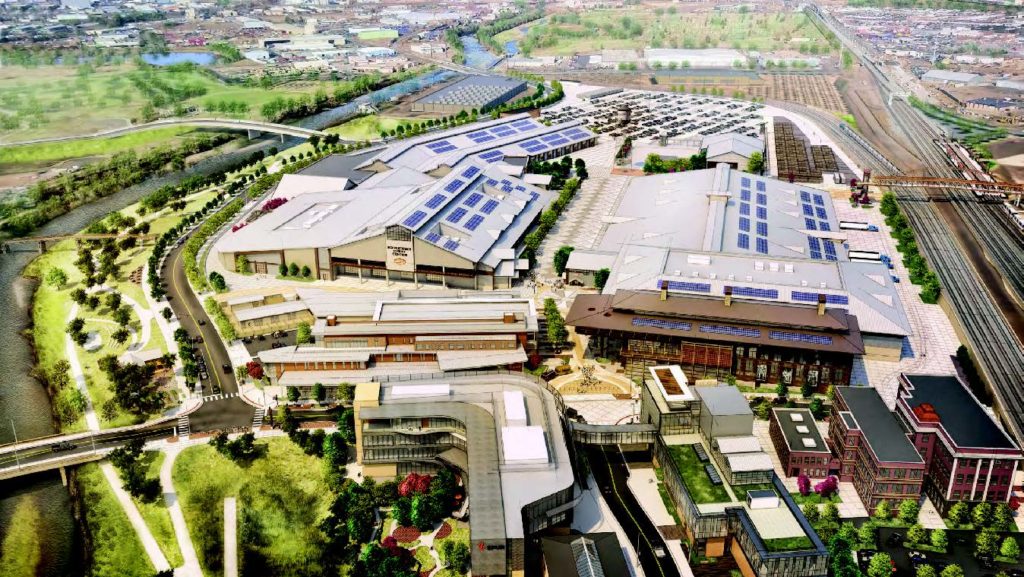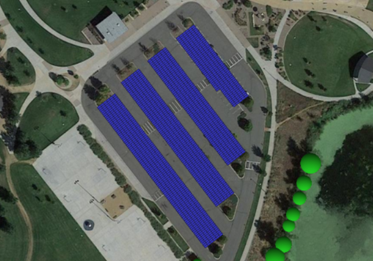Local Government:
City and County of Denver, ColoradoProject:
Renewable Denver InitiativeCategory:
Community SolarProject Purpose
To procure 4.6 megawatts (MW) of solar energy, representing the first phase of an effort to host up to 15 MW of community solar gardens on municipal sites in Denver by 2025. The initiative aims to expand the economic and environmental benefits of renewable energy to more community members while helping Denver advance its goal of 100 percent community-wide renewable electricity by 2030.
Project Overview
In April 2020 the Colorado Department of Local Affairs’ Renewable and Clean Energy Challenge grant program awarded the City and County of Denver $1 million to fund the Renewable Denver Initiative. The grant supports Denver in hosting its first portfolio of community solar gardens on municipal properties, including rooftops, parking lots, and vacant lands. The power generated from the solar gardens will be shared between City facilities and income-qualified residents. In addition, the arrays will be sited to provide power to publicly accessible electric vehicle charging stations.
The Renewable Denver Initiative includes unique features aimed at combining climate and community benefits. The initiative specifically focuses on increasing equitable access to clean energy in Denver, with 20 percent of the energy generated by the solar gardens to be allocated to income-qualified housing and low-income residents to help alleviate their energy burden. In addition, the initiative includes a paid workforce training program available to Denver residents, run in partnership with GRID Alternatives, that will field about 10 percent of the City and County’s solar workforce.
“This initiative is an opportunity to improve our air, mitigate the effects of climate change and invest in our community. And by leading on climate issues, it’s also a way to help residents lower their electric bills.”
Denver Mayor Michael B. Hancock
Denver engaged several stakeholders, including its Climate Action Task Force, the Colorado Solar and Storage Association, and Energy Outreach Colorado, to develop the Renewable Denver Initiative. Project site selection and design occurred during the latter half of 2020; Denver then submitted project details to Xcel Energy for approval in early 2021. (The City is also working with Xcel Energy on a longer-term effort to install community solar gardens throughout Denver.)
The strategy of hosting community solar gardens on municipal property is relatively new in Colorado. The Renewable Denver Initiative is a pilot effort that may serve as a model for future projects throughout the state.
In December 2021, the City announced that Denver’s City Council had approved remaining funding needed for this first phase of this project. Construction is expected to begin in early 2022 , and the systems are expected to be operational later in 2022.
How was the deal structured?
Denver chose to finance and own the solar projects (although it included an option for third-party financing in its procurement) and is partnering with building design and construction firm McKinstry to design, build, and maintain them. Denver and McKinstry signed a Master Services Agreement, providing flexibility for the two parties to craft one or several portfolios over a multiyear period.
What were Denver’s biggest challenges in setting up this project?

Obtaining buy-in: Prior to this project, Denver had never administered a municipal community solar program before. The program touches numerous city departments, including finance, real estate, legal, general services, permitting and zoning, parks and recreation, and the Denver International Airport. The projects are intended to be highly visible to the community, which requires the City and County to engage with Registered Neighborhood Organizations, City Council members, and agency executives to answer questions and build support for the program. The community-oriented elements of Denver’s solar program have been critical to its success so far.
Compiling the solar portfolio: Information on City properties relevant to solar development can be scattered across multiple agencies and staff. Additionally, some properties may have bond limitations, conservation easements, future development plans, grid interconnection constraints, and other considerations that may impact a site’s suitability for solar.
Financing the solar portfolio: The first financing option Denver considered was to enter into a PPA for the produced electricity, with a third-party financer owning and operating the projects. The anticipated margins for third-party ownership suggested that the City would break even on its electricity costs, at best. By instead paying for and owning the panels itself, the City will be able to sell electricity to subscribers, including some City facilities, at rates guaranteed to save subscribers money. Payments from subscribers for the electricity will allow the City to recoup its initial financial investments for the solar gardens over the course of the subscription periods. However, City ownership of the portfolio requires access to upfront capital, which Denver is fortunate to have through a newly established Climate Protection Fund.
Securing utility approval: Denver’s local utility, Xcel Energy, administers a community solar garden program with limited available capacity allocations. Denver submitted a proposal and competed with private solar developers to win awards for capacity through both the competitive solicitation and first-come-first-serve community solar program options.
What advice would Denver give other local governments as they pursue climate action projects?

Collaborate on a vision: Inspire a shared vision for success in which all stakeholders win. Having champions internally and externally in all the relevant groups goes a long way.
Make a business plan and treat the project like an investment: Clearly identify all necessary resources, along with anticipated outcomes for the project. Third-party ownership can enable solar deployment at no upfront cost to a local government. However, local government ownership can carry much greater long-term value. A city’s department of finance can use creative financing strategies, such as green bonds or other financial mechanisms, to enable investments that result in energy cost savings.
Participate in the regulatory process: The existing programs available in a jurisdiction may be inadequate for achieving a city’s various clean energy, climate, and community empowerment goals. By intervening with a state public utilities commission or directly engaging with utilities, cities can influence the types and structures of the programs available, including helping to drive the development of new programs to support city goals.
How does this project fit into Denver’s broader climate and community goals?
Denver’s 80 x 50 Climate Action Plan outlines a goal to transition Denver to 100 percent renewable electricity for municipal buildings by 2025 and achieve 100 percent community-wide renewable electricity by 2030. In addition, the plan articulates various other carbon reduction goals pertaining to buildings and transportation. Collectively, these targets aim to reduce Denver’s greenhouse gas emissions 80 percent, as compared to a 2005 baseline, by 2050.
Denver’s 100% Renewable Electricity Action Plan details how it will reach its goal of achieving system-wide renewable electricity by 2030. This project is helping advance Denver toward these goals. In addition, the project contributes to the City’s collaboration with Xcel Energy through their Energy Future Collaboration Work Plan.
Providing access to renewable electricity in low-income communities has proven difficult. Companies offering community solar subscriptions require minimum credit scores that are prohibitive for many households that historically have had limited access to credit. That means many customers must pay for rooftop solar systems out of pocket, which is not feasible for many residents. Additionally, many low- and moderate-income residents do not own their homes or move frequently and are therefore not suitable candidates for rooftop solar.
“Hosting community solar gardens on municipal property is new in Colorado and holds significant promise. Compared to privately-owned land, municipal sites can be made available at lower cost and this approach also provides solar power to members of the community.”
Jonathan Rogers, Renewable Energy Specialist, City and County of Denver
Hosting local community solar enables Denver to more effectively connect its low-income households to reduced-cost, clean electricity. Since Denver owns the project, it can set its own standards. The City and County have opted to subscribe 10 percent of the community solar power to low-income housing through the Denver Housing Authority. The other 10 percent will be allocated to low-income households through Energy Outreach Colorado, and will be exempt from subscription fees. As a result, more of those households’ income can go to the essentials they need to support their families, which in turn supports Denver’s broader equity goals.
Additional Information and Resources
- Denver Receives $1,000,000 for Community Solar Gardens (City & County of Denver press release)
- City Council Approves Multimillion Dollar Contract to Install Solar (City & County of Denver press release)
- Renewable Denver Initiative (City & County of Denver’s initiative page)
- 80 x 50 Climate Action Plan (City & County of Denver’s plan)
- 100% Renewable Electricity Action Plan (City & County of Denver’s plan)
- Climate Protection Fund (City & County of Denver’s fund page)
- Colorado Energy Future Collaboration Work Plan (City & County of Denver & Xcel Energy plan)
- Denver Looks to Install 15 MW of Community Solar Gardens (News article)
- Renewable and Clean Energy Challenge grant program (State of Colorado grant program page)
The City and County of Denver received technical assistance from the American Cities Climate Challenge Renewables Accelerator on this project. This project was included on the Renewables Accelerator’s list: 10 of the Most Noteworthy Local Government Renewables Deals of 2020.
